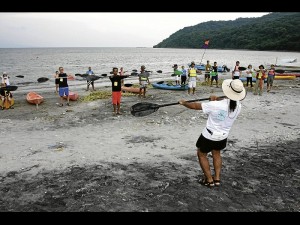Can microenterprises work in tourist zones?

A KAYAK instructor shows the proper way to handle an oar. Kayak clinics may charge as much as P500 per person per day
Palawan, Oriental Mindoro and Camarines Norte are among the most captivating of our provinces, filled with coastal areas, beaches and resorts, rivers and streams, venues for adventures aqua sports, and attractive to tourists both foreign and domestic.
In selected towns near the sea, bays and rivers, sports like kayaking, along with related activities, can be harnessed – in fact, are being harnessed – to provide livelihood and augment the income of local residents, including farmers, fisherfolk, indigenous peoples and unemployed but trainable persons.
Equal importance is being attached to protection of, and care for, the environment in the face of destructive forms of livelihood like dynamite or cyanide fishing.
Local government units (LGUs) and non-government organizations (NGOs) are among those behind these developing micro enterprises. And their guiding philosophy is yet another KKK: Kasiyahan (Recreation), Kabuhayan (Livelihood), and Kalikasan (Nature).
Camarines Norte, for example, faces the Pacific Ocean and has seven islands. One town mayor has approached the Philippine Kayaking Association for a livelihood-environment project. The town is ideal for surf kayaking.
In Oriental Mindoro, another town is developing under its mayor a white water kayaking livelihood project which will benefit Mangyan constituents who will be trained as kayaking guides.
“And residents in this town in [Central] Palawan want us to explore the river as part of their tour packages,” says Andrea (Didi) Camara, secretary-general of the kayaking association and vice-president of is corporate arm, Sun & Sea Sports Systems, Inc. So the focus here is on river kayaking.
“It’s more of an advocacy for us,” adds Camara. “But it also sustains us because we charge professional fees and supply some of their water sports requirements. We are doing a lot of support in training. We train the beneficiaries through the support of these LGUs.”
Package tours have been identified as an ideal source of livelihood that can be or is being developed. The residents will derive their income from kayaking, from kayaking clinics, from rentals of equipment, and as tour guides.
For a day package tour, the beneficiaries can charge from P700 to P2,000. Rentals of a kayak may range from P250 to P400.
“For kayak clinics,” Camara points out, “they could charge as much as P500 per person per day, depending on the area or duration, or the level of instruction.”
It is the LGUs and the NGOs who will draw up the budgets.
“The beneficiaries will organize and definitely kikita sila [they will earn],” the kayaking specialist predicts. “It always starts as an alternative and eventually develops into a main source of income.”
At the same time, kayaking is not a stand-alone activity, and will be integrated into other outdoor and adventure activities.
“It’s a way of helping the economy and indirectly and directly protecting the environment,” Camara concludes.
